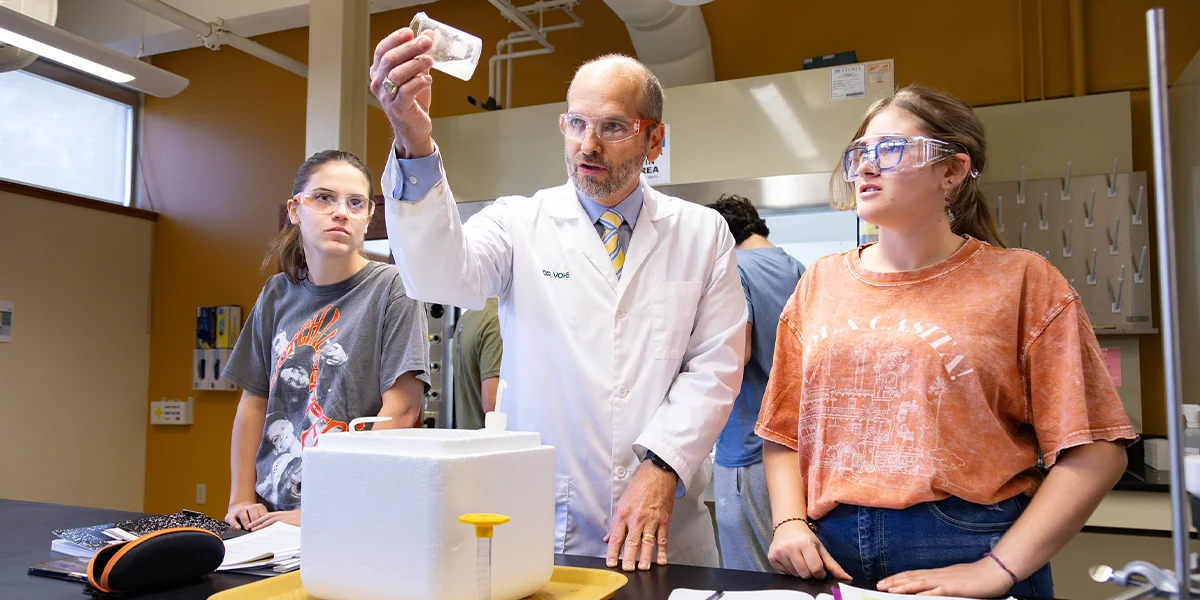Public Health
- Minor

-
In This Section
The Public Health Program
Public health applies humanities and social and natural sciences toward the mission of "fulfilling society's interest in assuring conditions in which people can be healthy". Public health as a field depends on professionals with expertise from a wide range of disciplines, and functions best when those professionals are prepared to think and synergize across interdisciplinary lines. This minor is designed around a set of three foundational courses that will engage students in foundational topics in public health and provide them with opportunities to learn about the design, implementation and evaluation of public health programs. Students, in consultation with their major and minor advisers, will select a set of four electives that align with their interests and contribute to their intellectual and professional development in key areas of competency. This program is in keeping with the AACU goal of preparing an educated citizenry to meet the public health needs of our domestic and global futures.
Undergraduate Programs
Undergraduate Admission
Phone:
800-782-5549
Ext. 2500
Email:
admission@stvincent.edu
Curriculum Requirements
-
Requirements for a Minor in Public Health
Required courses: (9 credits)
AN 285 Foundations of Public Health - 3 credits
SO 248 Fundamentals of Epidemiology - 3 credits
HI 2xx Global Health - 3 creditsStudents must complete four courses (at least 12 credits) from at least two of the five clusters of courses below. No more than one may be at the 100-level. Up to three credits may be fulfilled using a public health related internship or independent research experience with a faculty member.
Cluster 1
EL 111 Green Writing: Literature and the Environment - 3 credits
HI 206 Acupuncture to Alchemy: Topics in Medical History - 3 credits
HI 209 Issues in Contemporary East Asia - 3 credits
Hl 226 Society and the Environment: The American Experience - 3 credits
HI 283 Health and Medicine in East Asia - 3 credits
PL271/PS261: Catholic Political Thought - 3 credits
TH 280 Catholic Bioethics - 3 credits
One of the following:
PL 216 Ethical Problems - 3 credits
PL 217 Environmental Ethics - 3 credits
PL 218 Bioethics - 3 creditsCluster 2
BA 335 Internet Marketing - 3 credits
**CS 214 Introduction to Mobile Application Programming - 3 credits
**CS 305 Web Technologies - 3 credits
**CS 350 Database Concepts and Information Structures - 3 credits
ES 220 Introduction to Geographic Information Systems - 3 creditsCluster 3
**BA 440 Government and Not-for-Profit Accounting - 3 credits
**BA 491 Operational Excellence in the Service Industry with Applications in the Health Care Professions - 3 credits
CA 140 Interpersonal and Organizational Communication - 3 credits
PS 222 State and Local Government - 3 credits
PS 345 Domestic Public Policy - 3 credits
PS 390 Environmental Law and Policy - 3 creditsCluster 4
AN 280 Medical Anthropology - 3 credits
AN 315 Applied Anthropology or
AN 360 Qualitative Research Methods - 3 credits
AN 295 Culture and Health in Guatemala - 3 credits
**PY 322 Health Psychology - 3 credits
PY 373 What Would Fred Rogers Do? - 3 credits
SO 340 Sociology of Health and Illness - 3 credits
SO 161 Environmental Sociology - 3 credits
Cluster 5
Note: Physics, chemistry, biology or biochemistry majors are not recommended to use NSCI courses to fulfill the minor requirements.
NSCI 110 Bacteria, Friends or Foes? - 3 credits
NSCI 125 Introduction to Environmental Science (100) - 3 credits
NSCI 140 Science and Global Sustainability - 3 credits
NSCI 245 Killer Germs - 3 credits
NSCI 235 Human Biology and Laboratory - 4credits
NSCI 260 Biotechnology: How Do They Do It? - 3 credits
**BIN 219 Biomedical Informatics - 3 credits
**BL 212 Microbiology - 3 credits
**BL 216 Biotechnology - 3 credits
**BL 232 Ecology - 3 credits
**BL 250 Medical Microbiology - 3 credits
**CH 251 Proteins and Metabolism - 3 credits
**CH 252 Nucleic Acids and Membranes - 3 credits
** This course that has prerequisites that are not elective credits toward the minor.
Program Highlights
Student Learning Outcomes
- To introduce students to the core functions of public health including assessment, program & policy development, and assurance of quality public health provisions;
- To increase students' awareness and understanding of the importance of social, cultural, behavioral, psychological, biological, environmental and other processes to disease and health locally and globally;
- To foster skills and proficiencies students need to contribute to the changing field of public health through the development of health programs and policies, research, awareness, and leadership.
Undergraduate Programs
Undergraduate Admission
Phone:
800-782-5549
Ext. 2500
Email:
admission@stvincent.edu
